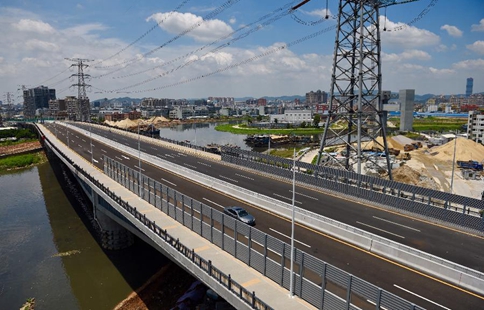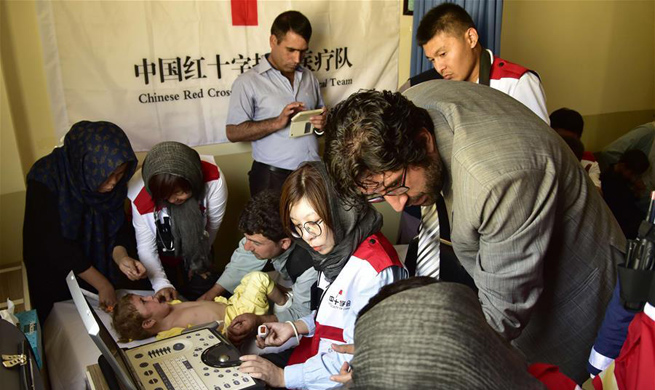ISTANBUL, Aug. 26 (Xinhua) -- Contrary to the Turkish president's expectations, the ongoing row between Turkey and Germany is not to die down following the German elections next month, analysts told Xinhua.
"President Erdogan's expectation is not realistic. The tension should be expected to increase," observed Huseyin Bagci, a professor of international relations from Ankara-based Middle East Technical University.
The row between the two NATO allies reached a new high after Turkish President Recep Tayyip Erdogan called on Turks in Germany last week to vote against Germany's leading parties, which he described as Turkey's enemies.
Erdogan drew sharp criticism from German politicians, who saw his remarks as an intervention in their country's domestic politics, with Chancellor Angela Merkel calling them "absolutely unacceptable."
"I don't expect the bilateral relations to improve following the elections," said Faruk Sen, president of the Turkish European Foundation for Education and Scientific Studies (TAVAK).
"The tension in relations may well drag on for a couple of years more," added Sen, who used to head the Essen-based Turkish Research Center when he lived in Germany for years.
Germany is set to hold general elections on Sept. 24, in which roughly 1.25 million out of nearly 3.5 million Turkish expats in Germany have the right to vote.
When the next government in Germany is formed, it would pursue policies targeting Erdogan, Bagci said, noting it is most likely that the new government would be set up by the parties attacked by the Turkish president.
Erdogan argued two weeks ago that Germany's rising criticism against Turkey had to do with the upcoming elections and the situation would improve thereafter, insisting that German politicians had been bashing Turkey with a view to garnering more votes.
Erdogan's statement has caused a fading crisis to enter a new phase, as it pushed Germany to handle the crisis as a state policy rather than as a short-term issue, said Cahit Armagan Dilek, director of the 21st Century Turkey Institute.
Some remarks by top German politicians suggest that Berlin would change its policies toward Ankara more easily if Turkey's ruling Justice and Development Party (AKP) loses power.
Germany and the rest of Europe should back the democratically-minded majority in Turkey which do not support Erdogan, German Foreign Minister Sigmar Gabriel said early this week.
In response, Turkey's EU Minister Omer Celik accused the top German envoy of copying from racists and far-right discourse in Europe against Muslims.
"It is not possible for the ties to normalize as long as Erdogan and the AKP are in power," maintained Bagci.
The accusations and inconsistency in remarks by Turkish officials have not only made Turkey perceived as an unreliable partner within NATO, but also increased anti-Turkish sentiment in Europe, stated Dilek, a former staff officer in the Turkish military.
Last month, Berlin withdrew all its Tornado jets from Turkey's Incirlik base after Ankara refused to allow German lawmakers to visit their troops stationed there.
The bilateral ties began to sour after a military coup bid jolted Turkey in July last year, as Ankara blamed Berlin for not returning members of the Turkish military affiliated with the coup plotters.
In addition, Ankara has often accused Berlin of sheltering militants from the Kurdistan Workers' Party (PKK), a terror group blacklisted by Turkey, the United States and EU.
The crisis with Germany broke out after Erdogan accused Berlin of adopting Nazi and fascist methods after the latter barred some Turkish cabinet ministers from addressing Turkish expats ahead of an April referendum in Turkey.
Germany, in response, criticized Ankara for stifling the rule of law and cracking down on dissidents following the failed coup.
Berlin has sharpened its criticism after Deniz Yucel, a Turkish-German human rights activist was arrested over charges of promoting the cause of PKK and stirring people to violence.
Germany last month introduced economic and military sanctions against Turkey, including steps that would hinder German investments in the country as well as partly block EU financial aid to Ankara and loans from the European Investment Bank (EIB).
"If Turkey's ties with the EU as well as with Germany continue to deteriorate, this may cost Turkey around 20 billion euros in economic loss in the long run," TAVAK's Sen warned.
He noted that loans Turkey is getting from the EIB had an interest rate as low as one percent on average.
The EIB provided a total of over 20 billion euros in loans to Turkey between 2007 and 2015.
Turkey's ties with the EU have also worsened in recent years, while Ankara's accession talks have stalled for quite some time.
Last month, the European Parliament voted for a non-binding proposal calling on the EU countries to suspend membership talks with Turkey should Ankara go ahead with constitutional changes to make way for a presidential system, as endorsed in the April referendum.
The EU has been grunting about the crackdown on dissidents, growing authoritarianism and violations of the rule of law in Turkey over the years.
Erdogan warned last month that Germany would pay a bigger price if it goes ahead with the punitive measures against Turkey.
Many feel, however, that Turkey would be more negatively affected if the crisis deepens, given that Germany is an economic giant with the capacity to sway the European bloc.
Turkey would be the losing side in this row, warned Bagci.
It is widely argued that Turkish expats in Germany - and in Europe in general - would pay a price for Erdogan's remarks about voting.
Turks in Germany would suffer economically as Germans may now shy away from doing business with them, stated Bagci, "in fact, there are already some such instances."

















